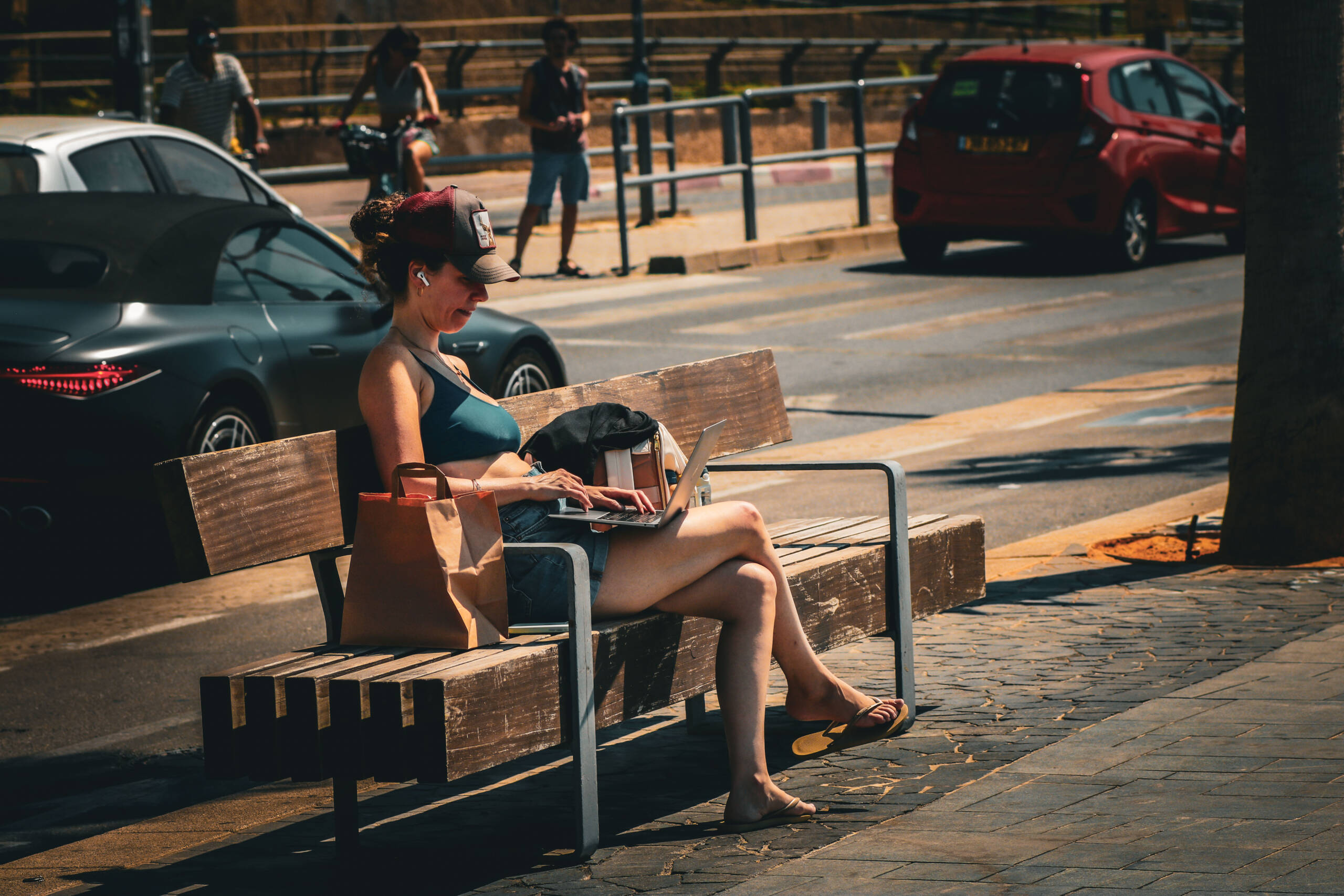The image captures a moment that feels both ordinary and telling of our times. A woman sits on a simple wooden bench with metal armrests, her body angled slightly sideways so that the midday sun falls across her bare shoulders and knees. She’s dressed in casual summer attire: a dark red cap pulled low, a blue tank top, denim shorts, and flip-flops, the kind of clothes that say “I’m on holiday” even before you notice the shopping bag at her side. Next to her, a laptop glows in the bright light as her fingers move across the keys. Earbuds are tucked in, suggesting she’s either on a call, listening to music, or perhaps absorbed in a podcast. Around her, life doesn’t pause: cars blur by, one sleek black convertible with its roof up, another small red hatchback edging forward. A cyclist passes in the background, his shadow cutting across the pavement, and two pedestrians stroll with a kind of unhurried looseness, dressed for the heat. The palm tree planted just behind the bench leans slightly into the scene, its base ringed by a patch of orange soil, a reminder that this is a sun-drenched, coastal city where holidaymakers and locals alike are caught between leisure and hustle. It’s a snapshot of contradiction — a body at rest, but a mind still tethered to work.

Vacation guilt often shows up exactly like this scene: sitting in paradise but bent over a keyboard, unable to fully disconnect. You tell yourself, “Just one more email, just a quick check-in,” but before you realize it, the very hours meant for freedom are parceled out to tasks that could have waited. Suppressing this guilt is not about ignoring responsibility; it’s about realigning your perspective. A vacation is not a dereliction of duty — it’s a recalibration. Time away, whether on a park bench, a beach chair, or a mountain trail, allows your nervous system to reset. The brain can’t function at its sharpest if it’s never allowed to wander. That wandering, by the way, is where creativity so often slips in unnoticed.
There’s a subtle discipline in knowing when to stop checking in. One useful trick is to give yourself a framework: if you must work, limit it to intentional, short intervals — a half-hour early in the morning, perhaps, while sipping coffee before the day begins, and then shutting the laptop firmly. Carrying it around everywhere, like in the image, blurs lines and feeds guilt rather than easing it. If you want the vacation to feel guilt-free, the real task is drawing those lines clearly.
But the deeper solution lies in allowing presence. Notice the warmth of the bench beneath your skin, the hum of cars, the laughter of strangers cycling past, the taste of something cold in the afternoon heat. Guilt thrives on abstraction — the sense of all the things undone, the imagined consequences — but presence thrives on what is here, right now, in the body and senses. When you lean into the immediacy of travel moments, guilt has less room to grow.
So perhaps the best way to suppress vacation guilt is not to fight it at all, but to let the world around you tug you back into its rhythm. A laptop can always wait, but the glow of a city street under the noon sun, the sight of strangers weaving in and out of your field of vision, the breeze off the sea — those are fleeting. You will not regret letting them take priority.
Leave a Reply